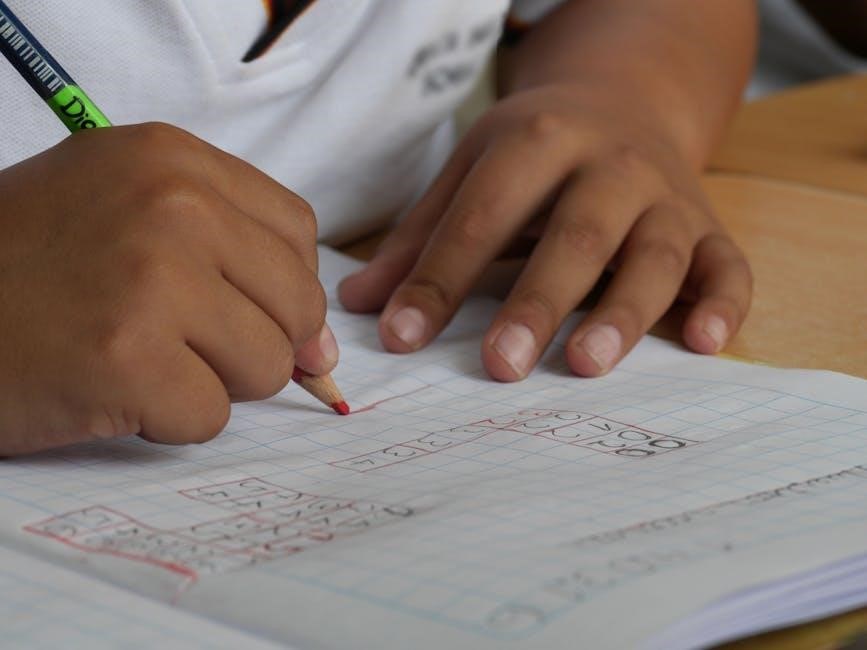
Year 6 Maths Tests assess students’ understanding of key mathematical concepts, including arithmetic, fractions, and geometry. These tests are crucial for evaluating progress and preparation for secondary school. Past papers and practice resources are widely available to help students familiarize themselves with the exam format and improve their problem-solving skills. Regular practice with timed tests and review of answers ensures better time management and confidence.
Importance of Year 6 Maths Tests
Year 6 Maths Tests play a pivotal role in assessing students’ mathematical proficiency and readiness for secondary school. These tests evaluate understanding of arithmetic, fractions, geometry, and problem-solving skills, which are essential for future academic success. High performance in these exams often influences secondary school placement, with top performers typically placed in higher sets or streams. Additionally, the tests help identify strengths and weaknesses, guiding targeted revision and improvement. Regular practice with past papers and PDF resources enhances time management, exam techniques, and confidence. The tests also align with curriculum objectives, ensuring students master key concepts before progressing. By focusing on mental maths, calculations, and real-world applications, Year 6 Maths Tests prepare students for more complex challenges ahead. Utilizing answer sheets and marking schemes aids in self-assessment, fostering a deeper understanding of mathematical principles.

Key Topics Covered in Year 6 Maths Tests
Year 6 Maths Tests cover arithmetic, fractions, decimals, percentages, geometry, and problem-solving. These topics enhance numerical reasoning and prepare students for more complex mathematical concepts in higher grades.
Arithmetic Operations and Mental Maths
Arithmetic operations and mental maths are fundamental components of Year 6 Maths Tests. Students are assessed on their ability to perform quick calculations, including multiplication, division, addition, and subtraction. Mental maths skills are crucial for problem-solving and applying mathematical concepts in real-life scenarios. Past papers and practice resources provide numerous exercises to enhance fluency in these areas. Regular practice with timed tests helps students improve their speed and accuracy, ensuring they can tackle more complex problems with confidence. Additionally, the tests include long division and long multiplication questions, which are worth 2 marks each, emphasizing the importance of precise calculation and clear methodology.
Fractions, Decimals, and Percentages
Fractions, decimals, and percentages are essential topics in Year 6 Maths Tests, requiring students to demonstrate a strong understanding of numerical relationships. Key skills include reducing fractions to their simplest form, converting between fractions, decimals, and percentages, and applying these concepts to solve real-world problems. Practice materials, such as past papers and answer booklets, provide extensive exercises to master operations like finding fractions of numbers or calculating percentages of quantities. Students are also expected to simplify complex fractions and use them as operators in calculations. Regular practice with timed tests helps build fluency and confidence in these areas, ensuring students can tackle problems efficiently during exams. These topics are critical for progressing to secondary school mathematics, making them a focus of Year 6 Maths Test preparation.
Geometry and Problem-Solving Strategies
Geometry and problem-solving strategies are vital components of Year 6 Maths Tests, requiring students to apply spatial awareness and logical thinking. Key topics include calculating perimeters, areas, and volumes of various shapes, as well as understanding properties of angles, symmetry, and coordinates. Problem-solving strategies involve breaking down complex questions, using mental maths techniques, and verifying answers through different methods. Practice test papers and answer sheets provide opportunities to refine these skills, ensuring students can approach unfamiliar problems with confidence. Regular practice helps students develop a systematic approach to geometry and improves their ability to interpret and solve mathematical scenarios effectively. These skills are foundational for more advanced maths in secondary school, making them a priority in Year 6 test preparation.

Recommended Resources for Preparation
Past papers, practice test books, and online PDF resources are essential for Year 6 Maths Test preparation. These materials provide realistic practice and detailed answers for self-assessment.
Past Papers and Solutions
Past papers and solutions are invaluable resources for Year 6 Maths Test preparation. These materials provide students with realistic practice, mirroring the actual exam format. Papers from previous years, such as those from 2000 to 2017, are widely available online in PDF format, offering a comprehensive range of questions covering arithmetic, fractions, geometry, and problem-solving. Solutions accompany these papers, enabling students to review their work and understand their mistakes. Many resources also include detailed marking schemes, guiding students on how to achieve full marks. By using past papers, students can familiarize themselves with time constraints and improve their exam techniques. These tools are particularly useful for identifying weak areas and reinforcing key concepts. Regular practice with past papers ensures confidence and readiness for the actual test.
Practice Test Books and Guides
Practice test books and guides are essential tools for Year 6 Maths Test preparation. These resources provide structured practice, focusing on key topics such as arithmetic, fractions, and problem-solving. Many guides, like the Schofield & Sims Primary Practice Maths series, include comprehensive question books with detailed answers and revision materials. CGP Books also offers popular resources, tailored to KS2 SATs, with clear explanations and practice questions. These guides often include timed tests and tips for improving exam techniques. By using these books, students can identify areas for improvement and build confidence. Additionally, guides like Year 6 Maths at Home offer topic-specific revision and practice, making them ideal for targeted learning. Regular use of these resources ensures a thorough understanding of the curriculum and effective preparation for the Year 6 Maths Tests.

How to Use Practice Tests Effectively
Set a timer to simulate exam conditions. Review answers thoroughly to understand mistakes. Focus on weak areas through targeted practice. Regularly track progress to improve efficiency and confidence.
Time Management and Exam Techniques
Effective time management is crucial for success in Year 6 Maths Tests. Allocate time evenly across all questions, ensuring enough for complex problems. Skim through the paper to identify easier questions first, completing them quickly to build confidence. For each question, read instructions carefully and plan your approach. Use the answer sheet efficiently, ensuring responses are clear and legible. Practice under timed conditions to improve speed and accuracy. Reviewing past papers helps identify common question types and improves familiarity with the format. Focus on problem-solving strategies and mental maths to save time during the test. Finally, always check your work if time permits to correct any mistakes. These techniques, combined with consistent practice, will enhance performance and reduce exam stress.

Answer Guidance and Marking Schemes
Understanding the answer guidance and marking schemes is essential for preparing for Year 6 Maths Tests. These resources provide detailed solutions to past papers and practice tests, helping students and teachers assess performance accurately. Marking schemes outline the correct answers, acceptable working methods, and mark allocation for each question. By reviewing these, students can identify common mistakes and improve their problem-solving techniques. PDF documents often include answer sheets and marking guidance, enabling learners to track their progress effectively. Regular practice with past papers and their corresponding marking schemes builds familiarity with the exam format and enhances confidence. Additionally, many educational publishers offer detailed answer booklets to support revision and teaching. Using these tools consistently ensures a thorough understanding of the test requirements and boosts overall performance.